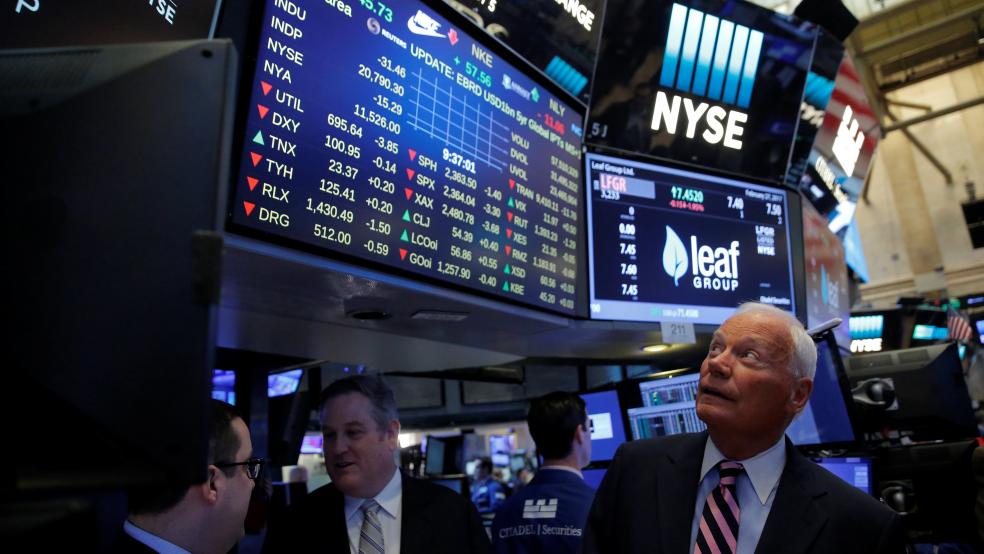NEW YORK (Reuters) - Think of the stock market right now as a high-school cafeteria. The most popular kids in school are growth investors, high-fiving and riding a multi-year bull run.
Meanwhile, the geeky kids off to the side, eating lunch by themselves, are the value investors.But those geeks often end up on top as adults. So even in this growth-oriented economy, you would be wise to have a value component to your portfolio.For a double bargain, look to value-driven exchange-traded funds, which not only offer rock-bottom management fees but in some cases have been matching or even exceeding the broader market in gains."Given how strong a bull market we have had, there will be an inevitable rotation to value," said Todd Rosenbluth, director of ETF and mutual fund research at independent advisory firm CFRA. "In fact, value has already showing signs of improvement."Take the Deep Value ETF from TWM funds. As the name implies, the fund contains in its top 10 holdings the stocks of a number of firms that have been battered, most notably in retail, including Macy's Inc, Target Corp, Kohls Corp and Gap Inc. Also represented in the Deep Value fund are some long-in-the-tooth tech firms like Seagate Technology PLC and Xerox Corp, and pharma play Gilead Sciences Inc. The result is an average price-earnings ratio of around 13, well below the S&P 500's collective P/E which is now over 25.Those beaten-up names might make investors a little queasy, especially since this ETF is so concentrated with just 20 stocks. But you cannot argue with the performance: It boasts one-year returns of 23.1 percent, matching the S&P 500, to add to 2016's 24.8 percent.Other value ETFs have been picking up bargains, while the rest of the universe obsesses over growth. Another standout is Guggenheim Investments' S&P Pure Value ETF. It sifts through the S&P 500, eliminates all growth stocks and the so-called "muddle in the middle," and comes up with 114 pure value plays.Among its top holdings is telecom provider CenturyLink Inc, Warren Buffett's Berkshire Hathaway Inc, agriculture play Archer Daniels Midland Co and General Motors Co.The one-year performance is 17.2 percent, with five-year gains at 16 percent annually - not bad for a supposedly out-of-favor strategy. "Since we've been in a market where growth has outperformed, many investors are now looking at value's relative appeal," said William Belden, Guggenheim's director of ETF development. "And over time, a value tilt tends to outperform its growth peers."The $890-million fund also boasts an affordable expense ratio of .35 percent. In the fund's rebalancing in December financial and utilities were trimmed back, thanks to their recent runups, while consumer discretionary stocks were boosted.A word of caution for value-minded investors: Such deep-value and pure-value screens tend to make holdings more limited, and therefore more volatile, than broader market indices.Investors wary of concentrated bets should perhaps look to a larger, steadier ship like Vanguard's Value Index Fund. This fund, five-star-rated by Chicago-based research shop Morningstar, contains 329 total stocks and annualized returns of 15.2 percent over five years.Its biggest holdings are familiar blue-chippers like Microsoft Corp, Johnson & Johnson, JP Morgan Chase & Co and Exxon Mobil Corp. Perhaps best of all for value-conscious investors, its expense ratio is a microscopic 0.06 percent.Part of the appeal of value ETFs is that when the next downturn comes, high-flying growth stocks will likely get pounded more than reliable blue chips. Value stocks traditionally provide more downside protection, in part due to their dividend payouts which provide a share-price floor and attract income investors. (Editing by Beth Pinsker and Cynthia Osterman)Bargain Bin: ETFs for value hunters

Andrew Kelly



